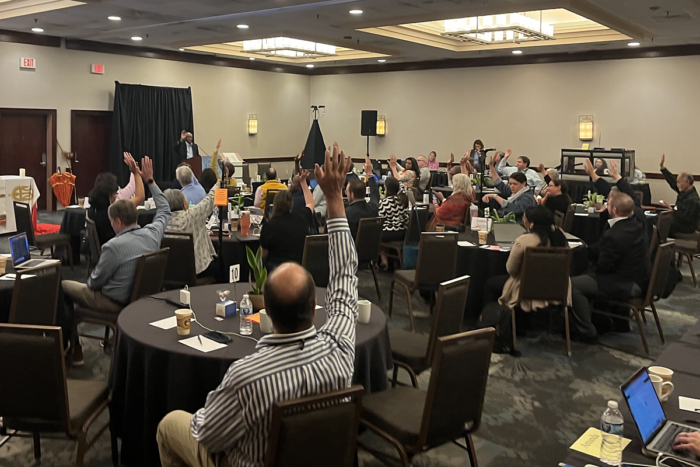Diocese of New Jersey receives one-year assessment reduction as it deals with financial issuesPosted Apr 22, 2024 |
|
[Episcopal News Service] The Diocese of New Jersey requested and received a hardship waiver for 2024 that allows it to pay less than its full 15% assessment – as is required of all dioceses to support the churchwide budget – while New Jersey leaders investigate and address what the bishop has described as “disarray” in its finances.
Executive Council, The Episcopal Church’s governing body between triennial meetings of General Convention, authorized the waiver April 20 at the conclusion of its three-day meeting in Raleigh, North Carolina. Instead of paying its full obligation of $600,000, the diocese will be required to contribute $400,000 under a one-year reduction.
The diocese had asked to contribute even less this year – $300,000, or 7.5% of its assessed revenue – but Executive Council’s Finance Committee settled on a reduced rate of 10%, which it said is in line with the waivers that have been granted to other dioceses dealing with short-term financial crises.
“Here in the Diocese of New Jersey, we are working to gain a full understanding of the financial issues we face, which will require completing overdue diocesan audits, correcting historical errors in financial recordkeeping, and obtaining accurate information about church properties,” Bishop Sally French told Episcopal News Service in a written statement after Executive Council’s vote.
French, who was consecrated as bishop in June 2023, shared an overview of the challenges discovered in the diocese’s past handling of its finances in a Feb. 27 letter and again in a speech March 9 at the diocese’s annual convention. At that time, she assured the diocese that there was “no indication of any financial malfeasance or fraud,” and she urged patience as diocesan leaders determine the full scope of the matter.
“We anticipate that it will take some time to come to terms with our financial situation and develop a strategy for the sustainability of God’s mission in our diocese,” French said in her April 20 statement to ENS. “We are grateful to the Executive Council for considering our request for a temporary reduction in our assessment rate so that we can have time to support our congregations and strengthen our budget, and we are grateful to other dioceses for their support as we move toward firmer financial footing.”

Executive Council votes April 20 to approve its consent calendar, a batch of resolutions that include a waiver for the Diocese of New Jersey allowing it to pay a reduced assessment to support the churchwide budget in 2024. Photo: David Paulsen/Episcopal News Service
Executive Council granted two other assessment waivers it its April 18-20 meeting. The Diocese of Colombia, one of the historically low-revenue Latin American dioceses in the church’s Province IX, requested and received a waiver allowing it to pay a 2.1% assessment, contributing $2,000 to the churchwide budget in 2024. Executive Council noted that Episcopal leaders in Colombia “have honored their commitments and are increasingly paying what they are able.”
And the Diocese of Hawai’i, where deadly wildfires devastated communities on the island of Maui last year, was granted a waiver that will reduce its assessment from $315,000 to about $150,000 for one year.
Overall, of the church’s 108 dioceses, at least 97 were in full compliance with their assessments in 2023, according to the most recent data provided to ENS by the church’s Finance Office. Of those, 93 paid assessments at the full 15% rate, while an additional four reported income of less than $200,000 – which is the amount of diocesan revenue the church exempts before calculating each assessment.
Dioceses that don’t contribute at the 15% rate and fail to apply for or receive approval for waivers can be ruled ineligible from participating in churchwide grant programs for one year. In 2024, the handful of ineligible dioceses include the Diocese of Springfield in Illinois, the Jacksonville-based Diocese of Florida, the Diocese of the Dominican Republic and the Diocese of Venezuela.
Diocesan assessments are The Episcopal Church’s largest revenue source. They total about $30 million a year, or 65% of the $143 million in revenue the church expects to collect under Executive Council’s proposed 2025-27 churchwide budget plan, which will be considered in June by the 81st General Convention.
Separately, at least four dioceses – Alabama, Arkansas, Georgia and Oklahoma – have asked the 81st General Convention to gradually cut the rate for all dioceses from 15% to as low as 10%, which budget planners warn could create a shortfall of up to $30 million in the three-year budget. The four resolutions proposing assessment reductions are scheduled for a Zoom hearing 8 p.m. Eastern April 30 before General Convention’s Governance & Structure committees. Anyone wishing to attend or testify are required to register in advance.
The Diocese of New Jersey historically has been one of the top revenue-generating dioceses in The Episcopal Church. In 2022, it reported revenue of $4.2 million, more than all but nine other Episcopal dioceses, according to Finance Office records.
Although French has not yet publicly released a detailed assessment of the financial challenges her diocese faces, she has spoken generally about overdue audits, inaccurate report, errors in recordkeeping, irregular payments and a failure to maintain appropriate financial and administrative controls.
The diocese’s previous canon to the ordinary for finance and administration has stepped down, and the diocese plans to relay on an outside accounting firm to help sort out the diocese’s finances.
– David Paulsen is a senior reporter and editor for Episcopal News Service based in Wisconsin. He can be reached at dpaulsen@episcopalchurch.org.

Social Menu